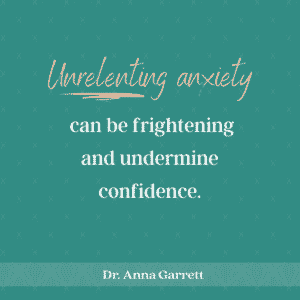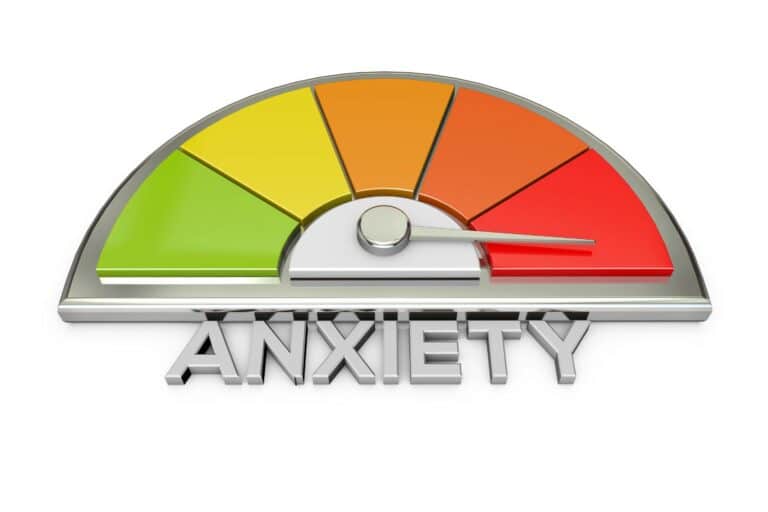Anxiety, a Most Challenging Symptom in Perimenopause
You might be surprised at the number of women who mention anxiety as their most challenging symptom of perimenopause. And interestingly, this is completely new for many of them.
 If this is your experience, you may suddenly feel unable to cope with situations that were never a problem before. Unrelenting anxiety can be frightening and undermine confidence. And many women assume they are slowly going crazy! The feeling of constant worry, tension, irritability, or loss of focus can be debilitating, especially if it results in scary things like panic attacks or heart palpitations. Note: if you have frequent episodes of heart rhythm irregularities, get checked out to make sure there’s nothing serious going on.
If this is your experience, you may suddenly feel unable to cope with situations that were never a problem before. Unrelenting anxiety can be frightening and undermine confidence. And many women assume they are slowly going crazy! The feeling of constant worry, tension, irritability, or loss of focus can be debilitating, especially if it results in scary things like panic attacks or heart palpitations. Note: if you have frequent episodes of heart rhythm irregularities, get checked out to make sure there’s nothing serious going on.
The good news with anxiety is that there is often a hormonal imbalance that you can correct. Low estrogen or progesterone levels may be the culprit. Both of these hormones have significant effects on the brain. The bad news is that you or your doctor may not recognize what’s going on and your doctor may dismiss you with “it’s all in your head” or come away with unnecessary prescriptions for anti-depressants or anti-anxiety meds that are only Band-Aids and do nothing to solve the underlying problem.
Fortunately, there are non-pharmaceutical approaches that can be helpful. Because we are all different, responses may vary.
Here are Some Supplement Options to Consider:
Ashwagandha
Ashwagandha is an adaptogenic herb often used as a natural remedy for anxiety because it helps stabilize the body’s response to stress. In addition to stabilizing cortisol, it protects the brain from degeneration and improves anxiety symptoms by destroying free radicals that cause damage to the brain and body. Ashwagandha helps to improve focus, reduce fatigue, and fight anxiety without the side effects of most anti-anxiety medications.
Kava Root
Kava improves mood, eases anxiety, and boosts sociability. It works by stimulating dopamine receptors. A randomized controlled trial conducted in Australia found that kava can be first-line therapy for generalized anxiety disorder. Take kava under the guidance of your health care provider, as it can interact with certain medications like benzodiazepines (Xanax, Ativan) or prescription sleeping pills (Ambien, Lunesta, etc.). Also, do not consume alcohol if you are using kava, and be aware of the most common side effects, including headache, drowsiness, and diarrhea. There are reports of liver damage with kava, but this is extremely uncommon.
Taurine
Taurine is an amino acid that increases glycine and GABA to calm the brain. It also protects the brain by reducing the harmful effects of excess glutamate. I consider taurine when I see someone with mood instability along with anxiety, but it may also be helpful for anxiety alone.
You may already be familiar with taurine, as it’s often added to energy drinks (e.g., Red Bull). Manufacturers consider it the drinkable solution for periods of extreme exertion when taurine levels can deplete. I don’t recommend replenishing it through energy drinks, though. You can find better ways to use taurine to calm your brain, and you probably don’t need the caffeine if you’re anxious!
GABA (Gamma-aminobutyric acid)
GABA is an inhibitory neurotransmitter that can cause a sedative effect, help regulate nerve cells, and calm anxiety. Anti-anxiety drugs, like Xanax and Valium, work to increase the amount of GABA in the brain. In addition, GABA supplements are available in your local health food or vitamin store. Or another option is to use valerian root, which naturally increases your brain’s GABA level and helps to calm anxiety. Be aware that valerian has a powerful odor!
Magnesium
Magnesium plays many important roles in the body, and magnesium deficiency is one of the leading deficiencies in adults. So if you’re struggling with anxiety, you may want to try taking a magnesium supplement. Magnesium is relaxing and helps GABA function. Look for magnesium glycinate, taurate, or threonate. These are forms that the body absorbs better. However, be aware that too much magnesium can cause diarrhea, so be careful with the dose.
B vitamins
B vitamins help to combat stress and stabilize your mood. Vitamin B6, in particular, is a natural remedy for anxiety because it boosts mood, balances blood sugar levels, and maintains a healthy nervous system. Vitamin B12 is also important for fighting chronic stress, mood disorders and depression. It helps improve your concentration and energy levels and allows your nervous system to function properly.
Inositol
Taken as a supplement, inositol has long been known to reduce general anxiety, panic, and OCD symptoms. In fact, researchers found inositol to be just as effective as a popular antidepressant for panic disorder, and participants tolerated it well even at massive doses up to 18 grams per day.
I recommend 4 gm 3 times a day (work up to this).
Essential Oils
In addition to supplements, some essential oils can be very useful for managing anxiety. Lavender oil is relaxing and has been shown to reduce anxiety as effectively as benzodiazepines when used in an oral capsule (Lavela WS-125).
Using lavender oil topically or inhaling lavender can help to induce calmness and relieve symptoms of anxiety like nervousness, headaches, and muscle pain. Put 3 drops of lavender oil in your palm and rub it onto your neck, wrists, and temples. You can also diffuse lavender oil at home or at work, inhale it directly from the bottle for immediate relief, and add 5–10 drops to warm bath water to fight anxiety naturally.
Roman chamomile essential oil is used to calm nerves and reduce anxiety because of its mild sedative and relaxation-promoting properties. Inhaling roman chamomile works as an emotional trigger because the fragrance travels directly to the brain to help fight anxiety symptoms. Diffuse 5 drops of Roman chamomile oil at home or at work, inhale it directly from the bottle, or apply it topically to the neck, chest, and wrists. Roman chamomile is also gentle enough for children to use as a natural remedy for anxiety.
I love and personally use doTERRA oils. You can access my site here.
Let’s Talk!
The real “fix” here is to determine underlying root causes and take appropriate action to regulate these. If you’re not sure, where to start, let’s talk. There’s no need to suffer through perimenopause
Dr. Anna Garrett is a menopause expert and Doctor of Pharmacy. She helps women who are struggling with symptoms of perimenopause and menopause find natural hormone balancing solutions so they can rock their mojo through midlife and beyond. Dr. Anna is the author of Perimenopause: The Savvy Sister’s Guide to Hormone Harmony. Order your copy at www.perimenopausebook.com.
Dr. Anna is available for 1-1 consultation. Find out more at www.drannagarrett.com/lets-talk




